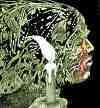
A forest fire is, in idle theory's terms, a very simple form of life that spreads and multiplies and finally, having rapidly consumed all its energy resources of timber, dies out. If forest fires were to slowly smoulder, never blazing up into open flame and spreading and multiplying, they would last much longer. And living things are 'burning' just like forest fires, except that they have broken down the process of combustion into a series of stages, releasing energy of sugar in small packets rather than all at once. Living things burn very, very slowly.
Among objects in everyday life, candles and cigarettes are slow burning things. But while candles burn continuously, a cigarette or pipe in use alternates between smouldering slowly between fingers, and flaring when drawn upon. A cigarette alternates between two states, much like Idle Theory's busy and idle states. A cigarette burns brighter when it's busy, duller when it's idle.
Tobacco is an aid to relaxation and concentration. If there are any two drugs that underpin Idle Theory, they are tea and cigarettes. Hand-rolled cigarettes.
Cigarettes are highly symbolic. And if they symbolise anything, it is relaxation and leisure. It isn't possible to do much work while holding a cigarette in one's hand. One must, very largely, stop work to have a cigarette. But this really only applies to manual, physical work. It doesn't apply to mental or intellectual work. You can carry on thinking while smoking a cigarette. In fact, you can do very little else. Smokers are necessarily thoughtful.
Smoking a cigarette is, in many ways, exactly like having a tea or coffee break. During the tea break, it is equally impossible to do any work, for exactly the same reason - you're temporarily doing something else, as you hold a mug and raise it to your lips.
A cigarette only takes a few minutes to smoke, and so it represents a short break from work. A pipe, by contrast, perhaps represents a longer and deeper commitment to relaxation. A roll-up cigarette, made in half a minute, is a small investment of effort. But a pipe made of wood or clay represents a much deeper commitment, a far greater investment in the act of smoking. If cigarette smoking entails having a whole series of successive short breaks, pipe-smoking implies a generally leisurely sort of life, conducted at a gentle and civilised pace. And smoking a cigar - particularly a very large cigar - must require the most complete and perfect leisure.
If, over the past century or so, pipe-smoking gave way to cigarette smoking, it is perhaps because life in the 20th century gradually became less and less leisurely. Cigarettes are for busy people, pipes are for people working at a leisurely pace, and cigars are for almost entirely leisured people. If soldiers in the trenches of the first world war adopted cigarettes, it was perhaps because war is not a leisurely business. In wartime, it's only possible to snatch a quick break now and then. For this, the cigarette was ideal.
A ban on smoking is therefore a ban on relaxation, a ban on leisure. It is the imposition of a work ethic in which there is no time to relax, and in which work is continuous. What makes a ban on smoking in pubs so absurd is that pubs and bars are places of relaxation. To ban smoking in pubs is to ban relaxing in pubs.
Puritans, it may be said, hate leisure. One might say that what busy, hard-working puritans hate about smoking is the indolence and leisure it implies. The smell of tobacco is the very odour of leisure. That man over there, smoking that cigarette, is not working. And he should be working. Everyone must work. And everyone must work all the time.
To ban smoking is to ban idleness, and force continual business. Banning smoking is like banning holidays. However, in Idle Theory, a life of continuous work is a life lived on the threshold of death. Only suffering will come of banning smoking.
Furthermore, since smoking is inherently an idle time activity, it ought not to be subject to legal sanctions. In Idle Theory's ethics, ethical behaviour is that which serves to maintain or increase idleness. It is because such behaviour is imperative for human survival that it takes on the force of law. Morality and law should both act solely to increase human idleness, and thereby to increase human freedom. Any law that restricts what men freely do in their idle time reduces their freedom of choice, and in effect reduces their idleness.
The war on tobacco is a moral crusade dressed up in the clothes of medical research. The dangers of passive smoking are entirely illusory. Very likely the dangers of active smoking are equally illusory.
